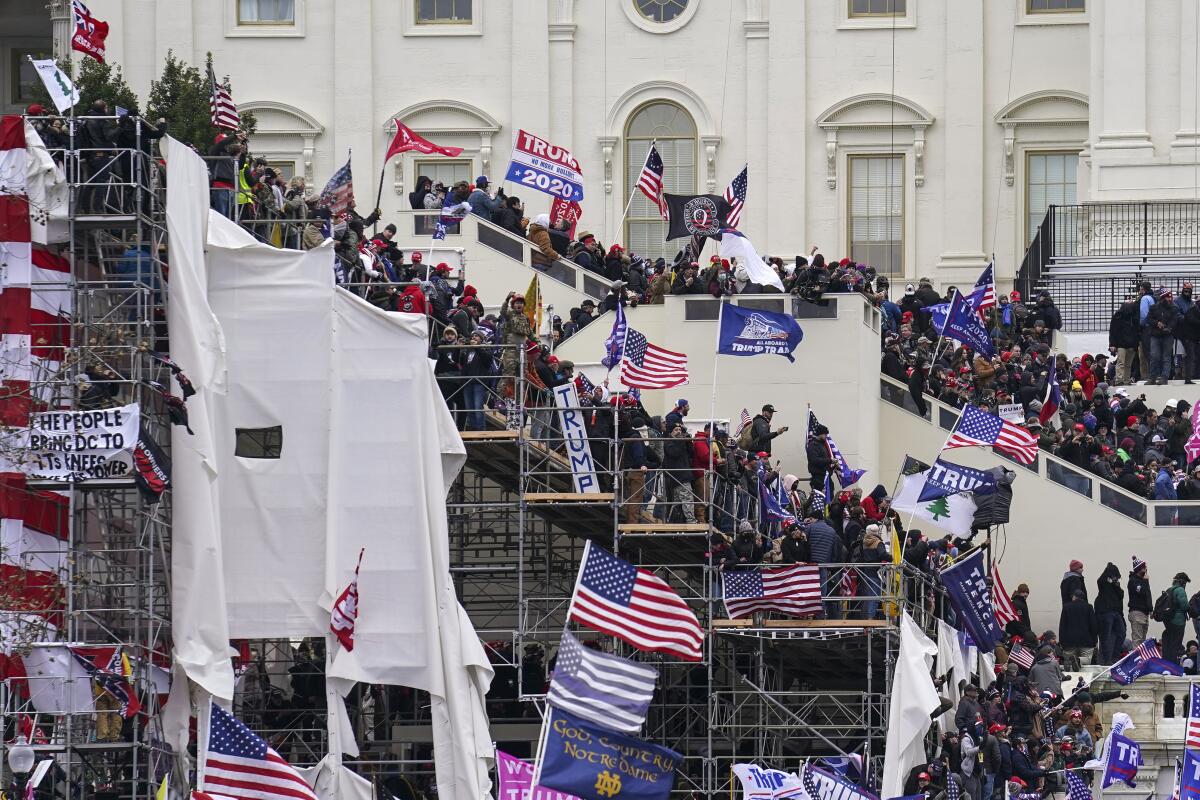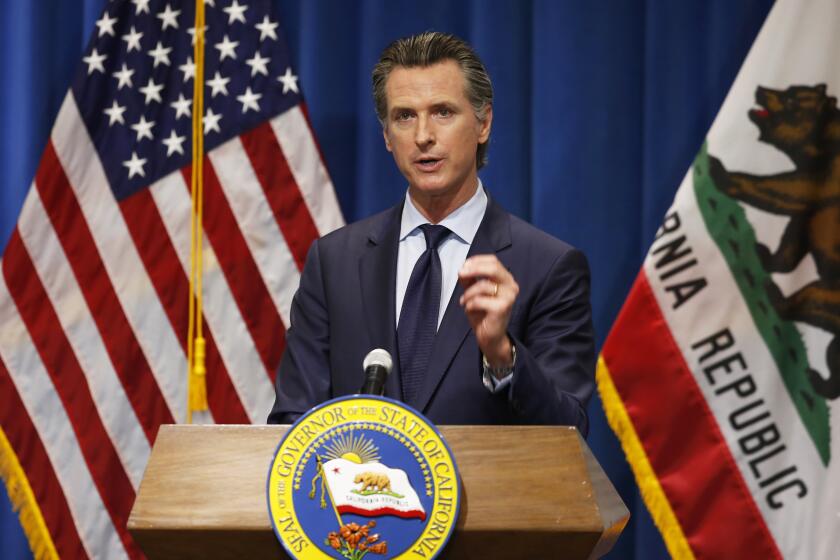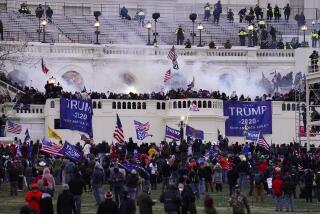Opinion: The big question: Was the Trump mob attack the end or the start of something?

It’s been five days since a horde of thousands attacked the U.S. Capitol in an act of insurrection aimed at keeping Congress from effectively ending the presidency of the man who summoned them, Donald Trump. But let’s not lose sight of the fact that President Trump never really has led the far right, which mostly glommed onto him after finding common ground in his rhetoric.
It’s clear that Trump must be impeached for his actions last week, and that if Senate Majority Leader Mitch McConnell (R-Ky.) once again stands with Trump and against both the nation and his oath of office, then he will go down in history as the wheelman for a strong-arm thug. Even McConnell’s wife, Elaine Chao, saw more than she could bear and resigned last week as Trump’s Transportation secretary. Whether she quit as an act of conscience or political self-preservation is up in the air.
But even if Trump is impeached and barred from ever running again, resigns, or simply fades into Twitterless oblivion, some 74 million Americans voted for him in November after seeing his authoritarian impulses on display for four years. Last week, thousands of them rushed to Washington to answer his siren call to “stop the steal,” and a subset of that group rampaged through the Capitol vandalizing and stealing and beating up police officers, killing one of them.
Trump’s call for his followers to take their grievances to Washington practically pushed his extremist base through the Capitol doors.
A PBS NewsHour-Marist poll found that two-thirds of Americans blamed Trump for the mob attack, which is strikingly low since he was the host of that little party. Remarkably, about half of the respondents didn’t think Trump should step down early because of it. So even while believing the president of the United States was responsible for a historical act of domestic terrorism, they don’t see cause for his immediate removal from office.
Notably, 69% of Republicans gave Trump a full pass on responsibility for the attack. That’s a hard-to-reconcile level of denial. Trump urged his supporters to come to Washington on Jan. 6 and then stood on a stage, the White House as a backdrop, and told them that “if you don’t fight like hell, you’re not going to have a country anymore,” before sending them streaming down the National Mall, where they clambered over manned barricades and then up the steps and into the Capitol.
So who do those Republicans think was responsible? Biden? Barack Obama? Hillary Clinton? The media?
Anti-government themes have coursed through American culture from the earliest days of the republic (the 1786 Shay’s Rebellion was a tax revolt). In recent years such sentiments, fed by an often narrow and romanticized notion of patriotism, formed the backdrop to the 2014 standoff with federal authorities by Cliven Bundy and supporters over his use of federal lands to graze cattle in Nevada, and the related 2016 takeover of the Malheur National Wildlife Refuge in Oregon (by a group that included Bundy’s son, Amnon) to protest prison sentences handed down to ranchers Dwight Hammond Jr. and his son, Steven, for intentionally burning federal lands. (Trump pardoned the father-son arsonists two years ago.)
There have been other harbingers of political violence, including the massing of armed anti-shutdown protesters in the Michigan Capitol building last year — they were described by Trump as “very good people, but … angry” — and the overlapping allegations of a plot to kidnap Gov. Gretchen Whitmer and put her on some sort of citizens trial.
Most of the nation shakes it collective head when such events occur. That’s not America, they mutter. We don’t act like that.
The most important job of California lawmakers right now is to prevent the income inequality gap from widening as a result of the pandemic.
Yet a study conducted in the weeks running up to the election found a distressingly high level of support among Trump’s backers (26%) as well as his opponents (21%) for resorting to violence should the election go the wrong way, and higher levels of support (46% among the pro-Trump faction; 36% among Trump opponents) for retaliatory violence in case the other side acted out first.
This is exactly the sort of thing democracy — a mechanism for resolving political differences without resorting to violence — is supposed to avert (one notable failure: the Civil War).
More troubling now, though, is that after Trump’s video message acknowledging that a new administration would take over on Jan. 20, some of the anti-government extremists began abandoning him, as Politico reports. And despite Trump telling supporters two days after the invasion that “we have just been through an intense election and emotions are high, but now tempers must be cooled and calm restored,” they are planning more actions in the federal and state capitals from Jan. 17 through Inauguration Day itself, Jan. 20.
That raises the concern that the attack on the Capitol, rather than being the culmination of something, was instead a step — a notion some of Trump’s more extreme supporters embraced with the final words of Trump’s video message: “To all of my wonderful supporters, I know you are disappointed, but I also want you to know that our incredible journey is only just beginning.”
Delusion can be a dangerous virus.
More to Read
A cure for the common opinion
Get thought-provoking perspectives with our weekly newsletter.
You may occasionally receive promotional content from the Los Angeles Times.












